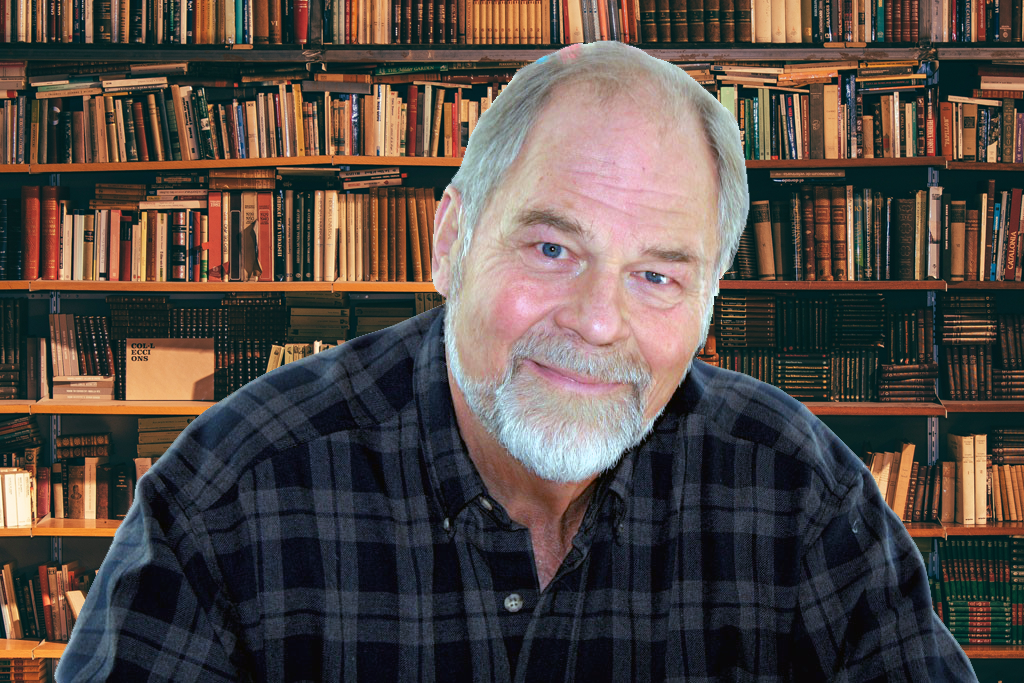Does it make any sense to say I heard dead silence? No matter. I’ll simply declare that I’ve never known such quiet in the sixty years I’ve roamed these woods and hills. I was sitting on a stump beside a frozen bog, an old man who needed rest from his ramble, however stately his pace. It was Christmas Eve, and I’d be well free of that soundless solitude when I returned to a house filled with beloved company, three generations’ worth, from me at 82 down to the youngest of eight grandchildren at six months. Some of the family had put up with holiday-mobbed airports in that hectic season for travel; but now, though I did see two jets’ contrails fading into my patch of gray sky, I didn’t hear any engine’s roar.
Having loved poetry since high school days, well before I started trying my own hand at it, I’d read and would always read poets new and old. So if I was about to say that some lines from Keats’s “La Belle Dame sans Merci” came to me quite unaccountably their arrival was really no mystery.
O what can ail thee, knight-at-arms,
Alone and palely loitering?
The sedge has withered from the lake,
And no birds sing.
Now there was no lake near where I’d stopped, nor was I anyone’s idea of a pallid knight: exertion and the day’s chill had turned me ruddy as any Santa, I suppose; yet I felt the emotional ambience of those lines, not so much because of the songless birds as of whatever their muteness might imply.
As I say, the whole world lay mute. Our three dogs had temporarily ranged out of sight and earshot, and I didn’t even catch the usual rustle of rodents in the fallen oak-leaves. Having no reason to speak, I made no sound myself. If I’d had human companions, they would hardly have suspected the uneasiness skulking beneath my seeming composure.
I first heard “La Belle Dame sans Merci” in my hormone-frenzied junior year of high school. Mr. Adams was our English teacher, slightly foppish– he even wore a beret. Before going on, I should note that we disrespectful punks nicknamed this small fellow The Squirrel. One day in class, seemingly out of the blue, The Squirrel demonstratively recited Keat’s ballad. He obviously had it by heart, and he immediately obliged us to memorize it by week’s end.
In time, I’d spend one year teaching high school too. By virtue of such brief experience alone, I came to regard secondary schoolteachers, especially inspired ones like Mr. Adams, as heroes. Teaching at that level is so demanding that I soon departed for graduate school and then took up a lengthy and relatively easygoing career as a college professor.
Sitting beside that bog on a bleak December morning, of course, I was anything but cursed like Keats’s poor knight; and yet something in the overbearing quiet made me – what would the poet have called it? – bereft? forlorn? My mystification about this anxiety, however, was brief. With a sudden inward wince, I recalled how Mr. Adams got fired well before school let out and how his pupils responded to that dismissal. His substitute for the rest of the year was so unremarkable, compared, that I can’t even remember his name, only his habit of erasing the chalkboard with the sleeve of the drab jacket he wore every day, so that his cuffs turned the color of chalk itself. He may was too bland even to earn a nickname.
It’s been a long, long time since The Squirrel’s abrupt firing, which, even if we teenagers didn’t know it, proved a calamity from an educational perspective. You’d think by now I’d have forgiven myself for laughing along with my acne-blighted clique over the grounds for his termination. School authorities tried to keep the matter hush-hush, but as such things will, the truth emerged before long. These were less enlightened times, or so many of us like to think. What’s more, thoughtlessness and adolescence are almost synonymous. Despite all that, and despite the love that Mr. Adams craved having never been sought from any schoolmate, the man was humiliated, banished.
I falsely claimed to anyone who’d listen that I knew our teacher was gay right along. I pointed to his flamboyant manner of reciting poems, all of which he’d clearly memorized. He’d well up when he delivered any of the Romantics, especially Keats, and he shed actual tears over work by a man named Hart Crane, whose poetry struck us as simply inscrutable. (Though I still don’t know why, a phrase from The Bridge– a poem long enough that Mr. Adams’s command of it still seems uncanny– snared my attention: shrill shirt ballooning.)
By whatever means, we came to hear how The Squirrel was disgraced. The father of some junior highschooler had caught him in the sort of bar that conventional society insisted he shouldn’t patronize. Looking back, I find it more than strange that that parent’s presence in the same place didn’t seem to cause a stir. Be that as it may, Mr. Adams paid the price.
The name of the bar, we somehow discovered, was The Hush Room.
Nowadays my tears seem to come as readily as breath, even more readily, in fact, than they did to our English teacher. There on my primitive seat, my weeping surprised me at first, then didn’t. Poor Mr. Adams, I thought. The tiny catch in my throat was the only thing to break the eerie, unwelcoming quiet.
The squirrel’s granary is full,
And the harvest’s done.
